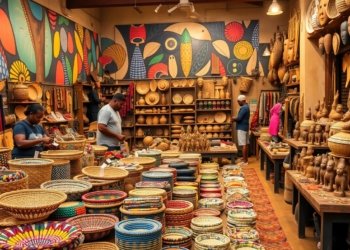Africa has a lot of potential with its rich resources and diverse cultures. But economic growth in Sub-Saharan Africa has challenges like conflict, poverty, and climate change.
Understanding what drives economic progress in Africa is important for sustainable development. By using natural resources, investing in people, and tackling issues like food insecurity and climate change, Africa can create a better future.
Organizations like the World Bank Group are helping with initiatives that focus on governance, education, and regional integration. These efforts are making progress and changing Africa’s economy.
Understanding African Economic Growth
Diverse Economic Landscape and Opportunity
The economic situation in Africa, especially in Sub-Saharan Africa, has a big impact on economic growth and development. The agriculture sector, services sector, and energy sector are important for driving this growth.
Agriculture is crucial for providing livelihoods, food security, and exports in African countries.
The services sector, which includes education and health services, helps in developing human capital and being resilient during economic crises like the COVID-19 pandemic.
Energy is needed to power industries, homes, and cities, supporting economic activities and innovation.
Urbanization in Africa brings opportunities for progress through increased productivity, better access to services, and investment potential in cities.
Although conflicts and fragility create challenges, it’s important to work on regional integration, improve household welfare, and reduce poverty rates for sustainable economic recovery and growth in Africa. This can be done by focusing on key sectors, developing human capital, and improving basic infrastructure to narrow the gap between economic growth and household welfare.
Opportunities for Growth
Africa has diverse sectors with great potential for growth and development. Industries like agriculture and services play a crucial role in boosting the continent’s economy. Urbanization and changing population trends create opportunities to enhance city economies and increase productivity. Companies in urban areas contribute to job creation, economic growth, and consumer spending, benefiting the region’s GDP and households.
Focusing on education, resilience, and human capital development can help Sub-Saharan African countries navigate challenges like conflict and recover from crises such as COVID-19, reducing poverty rates and improving livelihoods. By promoting regional integration, innovation, and investing in basic infrastructure and services, Africa can unlock its full potential and achieve sustainable economic growth for its people.
Population Shift, Diversity, and Economic Potential
Population shift in Africa is shaping the continent’s economic potential. More people are moving to urban centers, especially in West Africa. This shift is creating opportunities for economic growth in services, innovation, and employment sectors.
The demographic change increases demand for goods and services, attracting investment in infrastructure and human capital development. This drives GDP growth and reduces poverty. The talent influx and job creation in cities boost economies, especially in post-conflict and fragile regions, improving household welfare.
Africa focuses on resilience, education, and free trade areas to leverage its population dynamics. This strategy strengthens the economic outlook and addresses challenges such as food insecurity and climate change. Investments in infrastructure, education, and services are crucial for unlocking the continent’s economic potential, especially amid global uncertainties like COVID-19.
Key Sectors Driving Economic Growth and Poverty Reduction
The main sectors driving economic growth in Africa are agriculture, energy, and services.
Agriculture is crucial in the continent’s economy, contributing significantly to GDP growth, employment, and export earnings.
The energy sector is also important, with investments in renewable energy sources boosting innovation and economic development.
Services, such as education and healthcare, have shown potential for growth, creating jobs and improving human capital.
In light of COVID-19, resilience and recovery efforts are crucial for sustaining economic growth and reducing poverty rates.
Sub-Saharan Africa needs investment in basic infrastructure like schools and roads to enhance productivity and improve livelihoods.
International institutions like the World Bank are supporting initiatives to promote regional integration, reduce fragility, and address conflicts to foster sustainable economic development in Africa.
Impact of Urbanization on Economic Progress
Urbanization in Africa has a big impact on economic progress.
Growing cities boost productivity and competitiveness in different sectors. This leads to economic growth and sparks innovation.
As more people move to urban areas, it influences consumer behavior and market dynamics in emerging countries.
This shift affects consumption patterns, investment opportunities, and job prospects.
Urbanization also brings challenges like efficiently managing energy and services.
This is especially important in Sub-Saharan Africa, where agriculture and services are vital for economic growth.
Dealing with issues like conflicts, climate change, and city resilience is key for sustainable economic recovery and reducing poverty.
Investing in education, human capital, and basic urban infrastructure is crucial.
It ensures that economic growth improves household welfare and boosts resilience to events like the COVID-19 pandemic.
The World Bank and other partners support Africa in regional integration, free trade, and improving urban life through targeted efforts.
African Economic Growth Trends
Agriculture Sector’s Role in Economic Growth
The agriculture sector in Africa drives economic growth. It creates jobs and boosts consumer spending.
Investing in agriculture can increase productivity, improve household welfare, and reduce poverty rates.
Agriculture not only provides goods and services but also benefits other sectors like energy, education, and resilience.
Initiatives like cash transfers and infrastructure investments can improve livelihoods and tackle food insecurity.
Agriculture has potential for innovation and climate resilience, promoting sustainable economic development and recovery from conflicts.
Improving productivity and fostering regional integration are crucial for Africa’s agriculture sector.
It can support long-term economic growth and poverty reduction, in line with the goals of organizations like the World Bank.
Different Extractive Industries and Economic Development
Extractive industries in Africa are important for economic growth, especially in Sub-Saharan Africa. Mining and oil production contribute to GDP, exports, and government income. The challenge is to make sure these benefits reach everyone and last. Investing in people and new ideas can help African countries share the advantages by creating jobs and teaching new skills.
As cities grow in Africa, extractive industries can help by offering jobs and supporting local businesses. To make progress last, African nations need to focus on building strong communities, education, and basic services. This can help avoid problems like instability and conflicts that can slow down growth.
Using extractive industries wisely can increase economic growth, reduce poverty, and make life better for families over time. By making the right choices and plans, Africa can use its natural resources to create fair and long-term economic progress.
Growth in the Services Sector
The services sector in Africa has been driving economic growth on the continent.
Focusing on sectors such as education, energy, and innovation has increased productivity and resilience.
This growth has created employment opportunities and boosted consumer spending trends, improving livelihoods.
Efforts in infrastructure, education, and regional integration have further fueled sector expansion and potential for poverty reduction in Sub-Saharan Africa.
As African countries prioritize agriculture, energy, and talent development, the services sector is expected to play a crucial role in economic recovery and sustainable growth.
The World Bank’s support and investment in various initiatives across the continent indicate the sector’s importance.
Productivity, Employment Opportunities and Consumer Spending
Job Creation in Urbanizing Regions
Urbanization in Africa is linked to job creation. As cities grow, there’s more demand for services. This leads to better productivity and more job opportunities. To support job creation, policymakers can invest in education and human capital development. Urban areas can attract investment and reduce poverty by focusing on resilience and innovation. Dealing with factors like fragility and conflicts is crucial for sustainable job creation in growing cities.
The World Bank helps Africa by building infrastructure and promoting integration, improving livelihoods. By prioritizing job creation in urban areas, Africa can boost economic growth and create inclusive opportunities for its people.
Rise of Large Companies and Consumer Spending
Large companies in Africa have had a big impact. They have influenced how people spend money. These companies have helped the economy grow in Africa. They invest in areas like energy, services, and agriculture. This boosts the overall GDP of African countries.
These companies also create jobs. This helps people have more money to spend and reduces poverty. Large companies also encourage innovation, especially when facing challenges like climate change, conflicts, and COVID-19.
By investing in people, education, and basic infrastructure, these companies are improving the economy and making life better for people in Africa. The growth of large companies in Africa can bring more economic recovery, regional cooperation, and development in places like Sub-Saharan Africa and West Africa.
Interconnected Africa: Trade and Economic Growth
Millennium Goals and Economic Progress
Trade in Africa is closely linked to economic growth and the Millennium Goals. The continent faces challenges like conflict, high poverty rates, and debt distress. Different regions in Africa have varying economic growth rates, affecting progress towards the Millennium Goals. Efforts to tackle these challenges involve building resilience, protecting vulnerable populations, improving education, and creating jobs for economic growth.
Projects focusing on access to electricity, digital technology, regional integration, and governance play a vital role in achieving the Millennium Goals. The World Bank Group partners with Africa to support development goals, especially in pandemic preparedness, digital transformation, and regional integration. By addressing these challenges, Africa can reduce poverty and advance economically.
Economic Slowdown: Divergence, Challenges and Solutions
Africa is facing challenges due to the economic slowdown. These challenges include high poverty rates, rising conflict, and high debt distress risks. Efforts to tackle these issues involve combating food insecurity, building resilience, protecting vulnerable populations, educating people, creating jobs, and improving access to electricity and digital technology.
To address the economic downturn, African countries can leverage trade and international partnerships. By investing in regional integration, increasing productivity, and encouraging innovation in sectors like agriculture and services, nations in Africa can boost economic growth, reduce poverty, and improve household welfare.
Initiatives like the African Continental Free Trade Area aim to drive economic recovery, enhance job opportunities, and stimulate GDP growth in Africa. Collaborations with institutions such as the World Bank and the International Development Association can provide African countries with financing, knowledge, and resources to support sustainable development and economic transformation.
FAQs
Key factors driving economic growth in Africa include infrastructure development (e.g. improved roads, ports, and energy access), advancements in technology and innovation (e.g. mobile banking), investment in agriculture and natural resources sectors, and government policies that promote investment and entrepreneurship.
Investment in infrastructure in Africa has contributed to economic development by improving transportation networks, increasing access to markets, and attracting foreign investment. Examples include the construction of new roads, ports, and energy facilities that have boosted trade and industrial growth.
Some challenges faced by African economies in achieving sustainable growth include inadequate infrastructure development, political instability, corruption, and limited access to financing for businesses.
International partnerships can support economic growth in Africa by bringing in investments, technology transfer, and access to new markets. For example, partnerships with countries like China for infrastructure development or with global organizations for skills training can help accelerate growth.
Technology plays a crucial role in boosting African economies by creating new job opportunities, increasing productivity, improving access to markets, and enhancing efficiency in sectors such as agriculture, healthcare, and finance. Examples include mobile payment platforms like M-Pesa in Kenya and e-commerce platforms like Jumia in Nigeria.









